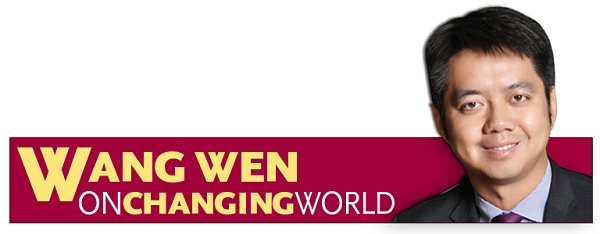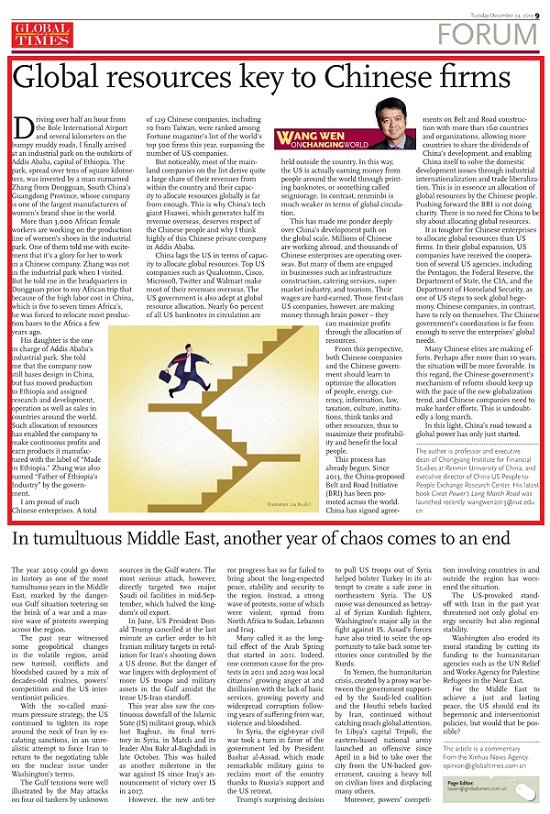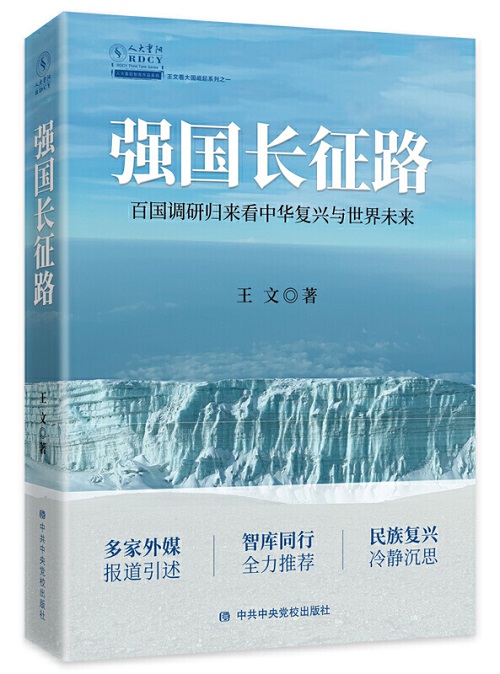Belt and Road
Your Present Location: PROGRAMS> Belt and RoadWang Wen: Global resources key to Chinese firms
By Wang Wen Source: Global Times Published: 2019-12-24

Driving over half an hour from the Bole International Airport and several kilometers on the bumpy muddy roads, I finally arrived at an industrial park on the outskirts of Addis Ababa, capital of Ethiopia. The park, spread over tens of square kilometers, was invested by a man surnamed Zhang from Dongguan, South China's Guangdong Province, whose company is one of the largest manufacturers of women's brand shoe in the world.
More than 3,000 African female workers are working on the production line of women's shoes in the industrial park. One of them told me with excitement that it's a glory for her to work in a Chinese company. Zhang was not in the industrial park when I visited. But he told me in the headquarters in Dongguan prior to my African trip that because of the high labor cost in China, which is five to seven times Africa's, he was forced to relocate most production bases to the Africa a few years ago.
His daughter is the one in charge of Addis Ababa's industrial park. She told me that the company now still bases design in China, but has moved production to Ethiopia and assigned research and development, operation as well as sales in countries around the world. Such allocation of resources has enabled the company to make continuous profits and earn products it manufactured with the label of "Made in Ethiopia." Zhang was also named "Father of Ethiopia's Industry" by the government.
I am proud of such Chinese enterprises. A total of 129 Chinese companies, including 10 from Taiwan, were ranked among Fortune magazine's list of the world's top 500 firms this year, surpassing the number of US companies.
But noticeably, most of the mainland companies on the list derive quite a large share of their revenues from within the country and their capacity to allocate resources globally is far from enough. This is why China's tech giant Huawei, which generates half its revenue overseas, deserves respect of the Chinese people and why I think highly of this Chinese private company in Addis Ababa.

China lags the US in terms of capacity to allocate global resources. Top US companies such as Qualcomm, Cisco, Microsoft, Twitter and Walmart make most of their revenues overseas. The US government is also adept at global resource allocation. Nearly 60 percent of all US banknotes in circulation are held outside the country. In this way, the US is actually earning money from people around the world through printing banknotes, or something called seigniorage. In contrast, renminbi is much weaker in terms of global circulation.
This has made me ponder deeply over China's development path on the global scale. Millions of Chinese are working abroad, and thousands of Chinese enterprises are operating overseas. But many of them are engaged in businesses such as infrastructure construction, catering services, supermarket industry, and tourism. Their wages are hard-earned. Those first-class US companies, however, are making money through brain power - they can maximize profits through the allocation of resources.
From this perspective, both Chinese companies and the Chinese government should learn to optimize the allocation of people, energy, currency, information, law, taxation, culture, institutions, think tanks and other resources, thus to maximize their profitability and benefit the local people.
This process has already begun. Since 2013, the China-proposed Belt and Road Initiative (BRI) has been promoted across the world. China has signed agreements on Belt and Road construction with more than 160 countries and organizations, allowing more countries to share the dividends of China's development, and enabling China itself to solve the domestic development issues through industrial internationalization and trade liberalization. This is in essence an allocation of global resources by the Chinese people. Pushing forward the BRI is not doing charity. There is no need for China to be shy about allocating global resources.
It is tougher for Chinese enterprises to allocate global resources than US firms. In their global expansion, US companies have received the cooperation of several US agencies, including the Pentagon, the Federal Reserve, the Department of State, the CIA, and the Department of Homeland Security, as one of US steps to seek global hegemony. Chinese companies, in contrast, have to rely on themselves. The Chinese government's coordination is far from enough to serve the enterprises' global needs.
Many Chinese elites are making efforts. Perhaps after more than 10 years, the situation will be more favorable. In this regard, the Chinese government's mechanism of reform should keep up with the pace of the new globalization trend, and Chinese companies need to make harder efforts. This is undoubtedly a long march.
In this light, China's road toward a global power has only just started.
The author is professor and executive dean of Chongyang Institute for Financial Studies, at Renmin University of China and executive director of China-US People-to-People Exchange Research Center. His new book Great Power's Long March Road was launched recently.
























































































 京公网安备 11010802037854号
京公网安备 11010802037854号





